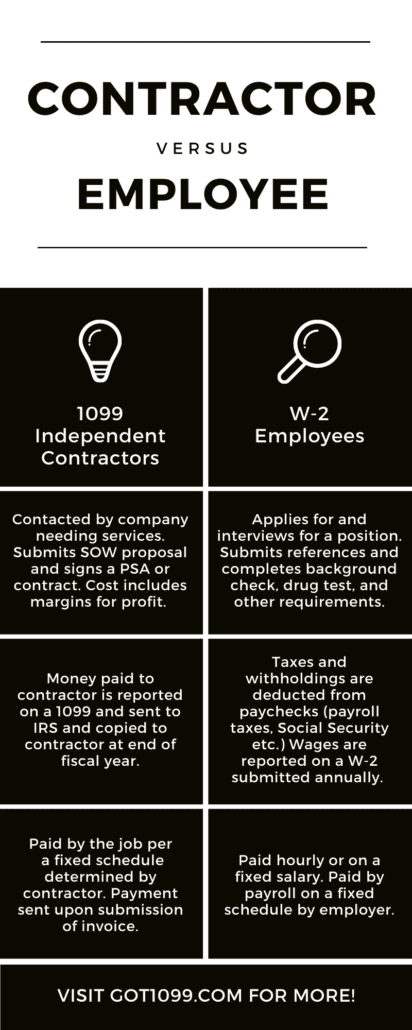1099 Classifications:
Assembly Bill 5 (AB-5), “The Gig Work Bill” fundamentally changed the way companies must think about worker classification. The wrong choice can mean thousands of dollars due to IRS, EDD, and CA State entities for back payroll taxes, worker’ compensation, fines, and fees. In extreme cases, misclassified workers can open a business up to criminal fraud charges for insurance fraud (think Workers compensation insurance avoidance)
AB-5, which went into effect on January 1, 2020, impacts how companies classify workers and how those companies manage and verify workers who are currently recognized as 1099 contractors. AB-5 tightens the definition of independent contractors and requires employers to examine 1099 contractors from 3 key facets, “The ABCs” to determine whether or not their workers should be reclassified as full-time W-2, wage-earning employees or, whether they can be kept as 1099 contractors.
Prior to the bassing of Assembly Bill 5, the 1099 classification rules were lengthy and complex (click here to view our infographic relating the old Borello 13 point criteria to the new ABCs of worker classification) However, since January 1, 2020, the updated and simplified ABCs of worker classification are the standard and many business owners are viewing their workforce in a different light.
The intention behind AB-5 is to prevent employers from taking tax shortcuts as well as to protect workers who do not choose to work part-time or be a part of the gig economy. 1099 workers do not earn benefits such as health insurance, paid time off, and unemployment insurance. Contractors d, however, set their own hours and determine their own rates for services provided. Many employers have classified workers as 1099s to avoid additional W-2 wage earner costs. Because of this, the California Employment Development Department (EDD) is on the lookout for misclassifications.
1099 Exemptions:
Despite the revisions to the contractor classification rules established by AB-5, The Gig Work bill, there are built-in exemptions. After the 2020 election cycle, the ride-share drivers were also exempted, adding them to the following list.
Occupational Exemptions
- Doctors, surgeons, dentists, podiatrists, psychologists, or veterinarians performing professional or medical services provided to or by a health care entity;
- Lawyers, insurance brokers, architects, engineers, private investigators, or accountants;
- Securities brokers/dealers or investment advisers and their agents and representatives registered with SEC, FIRA, or the State of CA
- Real estate agents, repossession agencies, direct-sales persons, commercial fishermen;
- Individuals performing services under a contract with a licensed “motor club.”
Professional Services Exemptions*
- marketing professional
- human resources professional
- travel agents
- graphic designers
- graphic artist
- fine artist
- freelance writer
- barber or cosmetologist
- esthetician
- electrologist
- manicurist
- payment processing agent
- IRS licensed tax professional
Referral Agency Exemptions
- graphic design
- photography
- tutoring
- event planning
- moving
- minor home repairs
- home cleaning
- errands
- furniture assembly
- animal services
- dog walking
- dog grooming
- web design
- picture hanging
- pool cleaning
- yard cleanup
Construction Industry Exemptions
*Construction is a particularly challenging area for exemptions take care
- Subcontracts must be in writing and the subcontractor must be properly licensed
- The subcontractor must be “customarily engaged in an independently established trade”—like a carpenter, plumber, or electrician
- The subcontractor must be licensed by the Contractors State License Board
- *NOTE the additional requirements for the construction industry exception
- The subcontractor must maintain a business location, separate from the hiring entity
- The subcontractor must be free to hire and fire its own workers
- The subcontractor must assume financial responsibility for mistakes in written warranties or indemnity agreements, or as evidenced by insurance or bonds
- Special restrictions apply to truck services
Any worker who is in an exempt category must still meet the original “Borello” requirements.
1099 tax filing rules, deadlines, and forms:
For the 2020 tax filing season, IRS has introduced a new form, 1099-NEC in addition to the 1099-MISC form options.
Instructions from IRS’s website can be found here
1099-MISC and 1099-K are separate forms covering separate filing instances… Form 1099-MISC reports miscellaneous income from services rendered among other sources of income (over $600)
- Rents
- Prizes and awards
- Other income payments
- Generally, the cash paid from a notional principal contract to an individual, partnership, or estate.
- Any fishing boat proceeds
- Medical and health care payments
- Crop insurance proceeds
- Payments to an attorney
- Section 409A deferrals
- Nonqualified deferred compensation
Form 1099-K reports payments received through a 3rd party provider (like a ride share service for whom you work). This form should be filed if you receive over 200 transactions, totaling over $20,000.
Form 1099-NEC, Nonemployee Compensation, is filed for anyone to whom a business pays at least $600 in:
- Services performed by someone who is not your employee (including parts and materials) or
- Payments to an attorney. File Form 1099-NEC or Form 1099-MISC to report sales totaling $5,000 or more of consumer products to a person on buy-sell, deposit-commission, or other commission bases for resale.
What types of 1099 forms are there?
Independent contractors get 1099s, not W-s. If you receive a 1099 this means that you were paid for work as an independent contractor. There are multiple 1099 tax forms, including:
1099-A – Mortgage Lender form
Canceled Mortgage debt and short sales of properties trigger 1099-A filings. Canceled debt is considered income in the eyes of the IRS and is therefore taxable in most cases.
1099-B – Securities and Barter Form
The sale of securities, as well as some types of barter exchange, trigger a 1099-B filing.
1099-C – Charged off Debt Form
Forgiven debt (as referenced in 1099-A) is likely taxable income. If your credit card provider forgave some portion of your debt or let you pay some portion of the total owed, they will issue a 1099-C and you must pay taxes on the charged-off amount.
1099-CAP
You might receive a 1099-CAP if you hold shares of a corporation that was acquired or underwent a big change in capital structure and you got cash, stock, or other property as a result.
1099-DIV
One of the most common flavors of this form, the 1099-DIV reports dividends you received. This doesn’t include dividends on your share account at the credit union. The IRS considers those interest, so they appear on another 1099: the 1099-INT.
1099-G
If you received money from state, local or federal government — including a tax refund, credit, or offset — you might get one of these. If you received unemployment benefits during the year, you might also have a 1099-G headed your way.
1099-INT
If you earned more than $10 in interest from a bank, brokerage or other financial institution, you’ll receive a 1099-INT. (Learn more about what do to with IRS Form 1099-INT.)
1099-LTC
If your long-term care insurance paid out benefits during the year, the insurer will likely file a Form 1099-LTC. If you received payments from the accelerated death benefits of a life insurance policy, those are reported on this form, too.
1099-MISC
This is a catch-all for income that doesn’t fit into other 1099 categories, though it does have some specific purposes. Income from prizes and awards are examples. (Learn more about what to do with IRS Form 1099-MISC.)
1099-NEC
In 2020, the IRS wants organizations to use a new form, the 1099-NEC, to report money they paid to people who did work for them but weren’t employees. In other words, if you freelanced, were self-employed, or had a side gig, your clients should send you a Form 1099-NEC instead of a Form 1099-MISC in early 2021.
1099-OID Bonds
Bonds, notes, or other financial instruments at a discount to the face value or redemption value at maturity. Typically, the instrument must have a maturity of more than one year.
1099-PATR – Co-Ops
Patronage dividends, greater than $10 form a Co-Op.
1099-Q 529 College Savings
Reports money that you, your child or their school receive from a 529 plan. ***earnings in a 529 plan are generally not subject to tax when they’re used for qualified education expenses.
1099-R – Pension and Retirement*
If you got distributions from a pension, retirement plan, profit-sharing program, IRA or annuity, you might receive a 1099-R. *many retirement plans are tax-advantaged, so this form might be simple record-keeping on behalf of the IRS.
1099-S – Real Estate Sales **
Anybody responsible for closing a sale or exchange of real estate furnishes this statement to you, reporting the proceeds. **proceeds from the sale of real estate is not necessarily taxable.
1099-SA – Health Savings
This is the form you’ll receive if you took any distributions from your health savings account, distributions generally aren’t taxable if you use them to pay for qualified health expenses.

LOCATION
La Jolla, CA 92037
o: (888) got-1099 (468-1099)
e: contact@got1099.com
copyright got1099®
copyright got1099?®
copyright Start1099®
GET AB-5 And CASLB Updates in your inbox
IMPORTANT INFO
Disclaimer
got1099 is a business reporting company providing business analysis reports to companies re: their 1099 independent contractors We do not provide legal advice. Consult with your attorney relating to any legal issues.


